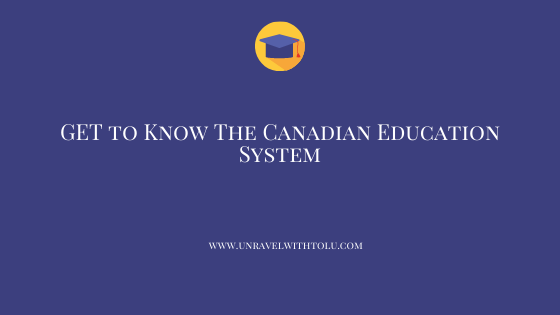
Canada has internationally renowned universities, which usually are public and private schools. Most institutions in Canada have undergraduate and Ph.D. programs that take between 3-5 years to complete while for the masters level it takes 1-2 years. The undergraduate degree makes use of the 4.0 GPA system. The graduate programs use a pass or fail system where you cannot get less than 70 % in 2 courses else, you will be asked to withdraw from the program. The Canadian education system requires a lot of hard work as it is very detailed and challenging.
Based on my experience, I consider the Canadian education system a true reflection of the work you have put into your education. I find that the lecturers have designed the system in such a way to ensure you pass at all costs. For instance, if you have clashing deadlines with other classes, lecturers will be flexible with deadlines to accommodate such needs. In regards to the current pandemic, universities are providing the option to grade students on a pass/fail basis.
Depending on your program you may not have classes every day and have a chance to work 20 hours per week as an international student. Also, you are required to take 3-6 courses in a semester. Canadian education expects that you should participate in class activities and discussions, you should be able to work in a team to develop a project and be a solution provider. The overview of my experience in the Canadian education system reflects the following things :
Read Also: Applying For A Study Permit
Quality of education is top-notch
Education in Canada is well structured and designed to prepare you for future opportunities through the courses, reading week, internships (coop) and study abroad exchange programs. Each course outlines the assignments, presentations, papers, exams and tests alongside the deadlines. These deliverables should be your own work and not something you copied online, hence plagiarism. A week is dedicated to concentrating on pending deliverables with no class. Also, the class experiences are hands-on and you have the chance to design your class which creates the opportunity to succeed at school.
Practical classroom
The Canadian education system indicates that exams and tests are not the true reflections of knowledge on a topic. Students get to design their class through class discussions, labs, presentations and assignments which showcase practicality. The hands-on experience deepens your understanding of the concepts taught in the classroom.
Research is important
The expectation of most degree programs is that you do some sort of research that contributes to the academic community. Research involves writing academic papers that require exceptional writing skills and there are so many writing tools that can help you develop this skill. Research plays an important role in the rank of any university and Canadian institutions are no exception. Also, this allows government and businesses to provide funds at universities hence why if you are taking a research-based degree you are more opportune to funding.
Multicultural Classroom
The lecturers and students are from different parts of the world which provides a rich and unique learning experience when it comes to in-class activities and discussions. The multicultural classroom has people of different ages, nationalities, socio-economic strata and so on. The environment promotes cultural relevance and facilitates learning to think beyond one’s immediate environment.
Programs are intertwined
Undergraduate degrees allow students to major and minor in multiple areas of interest. For instance, one can Major in Biology and minor in Chemistry and Biochemistry. Also, undergraduate and graduate students can have classes together which adds to your learning experience and you can take classes with students from various programs. This allows students to make friends outside their faculty.
For much more detailed information about the education system in each province, read here.
post a comment
You must be logged in to post a comment.


Choko
Thanks for the breakdown as always. This will come handy to anyone looking to study in Canada.
Bright
This is amazing! Wow
Unravel with Tolu
thank you Bright
Pingback: What I Wish I Knew Before Moving Abroad - Unravel With Tolu
Pingback: Tips For Taking Online Classes - Unravel With Tolu
Pingback: 5 Tools For Excellent Academic Writing - Unravel With Tolu